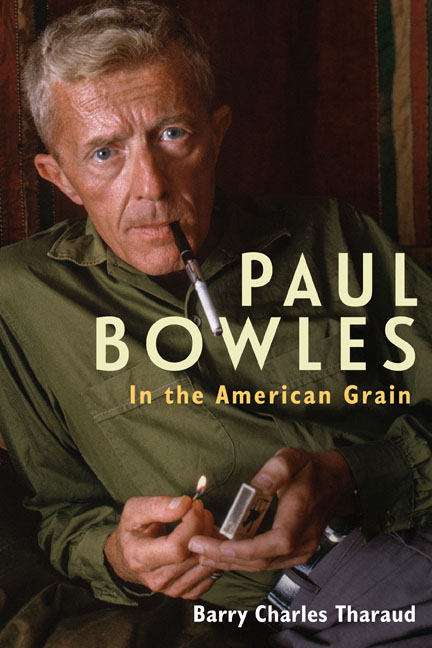Book contents
- Frontmatter
- Contents
- Preface
- Acknowledgments
- Abbreviations
- Introduction: Paul Bowles as a Canonical Writer
- 1 Paul Bowles on Intercultural Understanding: Too Far from Home
- 2 The Discovery of Existence: Without Stopping
- 3 Emersonian Shadows
- 4 Culture and Existence in Bowles’ Short Fiction
- 5 Gide and Bowles in North Africa: The Sheltering Sky
- 6 Language, Noise, Silence: Self and Society in Let It Come Down
- 7 The Spider’s House: The Social Construction of Reality
- 8 Existence and Imagination: Up Above the World
- 9 The Letters: In Touch
- Conclusion
- Bibliography
- Index
2 - The Discovery of Existence: Without Stopping
Published online by Cambridge University Press: 24 November 2020
- Frontmatter
- Contents
- Preface
- Acknowledgments
- Abbreviations
- Introduction: Paul Bowles as a Canonical Writer
- 1 Paul Bowles on Intercultural Understanding: Too Far from Home
- 2 The Discovery of Existence: Without Stopping
- 3 Emersonian Shadows
- 4 Culture and Existence in Bowles’ Short Fiction
- 5 Gide and Bowles in North Africa: The Sheltering Sky
- 6 Language, Noise, Silence: Self and Society in Let It Come Down
- 7 The Spider’s House: The Social Construction of Reality
- 8 Existence and Imagination: Up Above the World
- 9 The Letters: In Touch
- Conclusion
- Bibliography
- Index
Summary
THE SEMINAL DOCUMENT about Paul Bowles’ life is his own autobiography, Without Stopping, which was first published in New York by G. P. Putnam's Sons in 1972, and again in New York by the Ecco Press in 1985. The autobiography was written under duress, for money, to pay for the medical expenses for the terminal illness of Jane Bowles, who died on 4 May 1973. A 6 February 1983 letter from Paul Bowles to Richard Peabody, novelist and editor, is explicit and succinct:
Mrs. Bowles was constantly moving between hospitals in England, the United States and Spain. Even at that time this cost money. I decided that Putnam's offer of $15,000 would be of use, and undertook the writing of something I had every wish and reason not to write. I’m fully aware that there is no acceptable pretext for writing a bad book. I knew this one would be bad before I started it, but I wrote it anyway, for money. Every minute of the writing went against the grain, because I found it a terrible bore and entirely devoid of interest. (In Touch, 512–13)
Putting aside that Without Stopping was written for money during the painful time surrounding the approaching loss of a loved one, I believe that for Bowles the autobiography was “a terrible bore and devoid of interest” because it was completely antithetical to his phenomenological and existential life project: if one is recreating the past, one is not generally “living” the present. It is a disposal of existence for the never-never land of Being. Bowles suggests something of the sort on the last pages of Without Stopping:
Writing an autobiography is an ungratifying occupation at best. It is a sort of journalism, in which the report, rather than being an eyewitness account of the event, is instead only a memory of the last time it was recalled. Borges illustrates the situation with the story of his father's attempt to show him the untrustworthiness of memory; he lays a coin on the table and calls it the image itself. He puts a coin on top of the first one and calls that the first memory of the image. The next coin is the memory of that memory, and so on.
- Type
- Chapter
- Information
- Paul BowlesIn the American Grain, pp. 37 - 56Publisher: Boydell & BrewerPrint publication year: 2020

